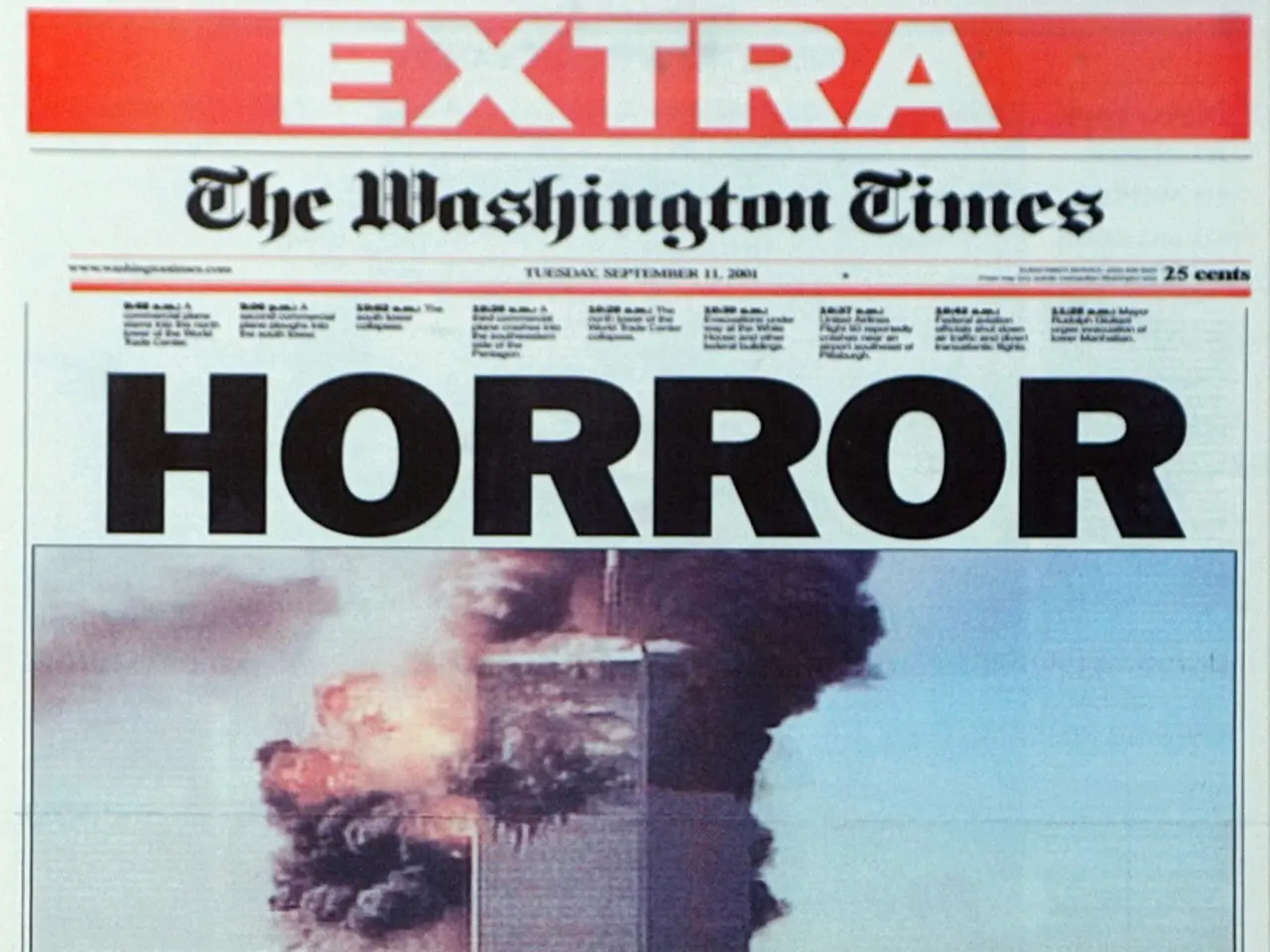Limiting journalistic coverage of Israel's conflict in Gaza
In the ongoing conflict between Israel and Gaza, the killing of Anas al-Sharif, a well-known Al Jazeera correspondent, has sparked a significant controversy. Al-Sharif was tragically killed in an Israeli strike on August 10, 2025, near Al-Shifa hospital in Gaza City [1][2].
The Israeli military has accused al-Sharif of being a member and leader of a Hamas cell involved in advancing rocket attacks against Israel [2]. However, Al Jazeera and multiple observers condemn the killing as a targeted attack on a journalist, emphasizing that al-Sharif had been threatened by the Israeli military and was a key source of news exposing the impact of Israel's war on Gaza [1].
Journalist colleagues and international press freedom advocates reject the Israeli military’s claims, stating that targeting journalists is a war crime [2]. Since the escalation of the Israeli-Gaza war starting October 7, 2023, at least 192 journalists have been killed, most of them Palestinians killed by Israel, with al-Sharif’s death marking the tenth Al Jazeera staff journalist killed by Israeli strikes [2].
The Committee to Protect Journalists (CPJ) warned that al-Sharif was being subjected to a "smear campaign by the Israeli military" [2]. Al Jazeera described the journalists' deaths as a "targeted assassination," constituting an "outrageous and deliberate attack on press freedom" [1].
The journalists were staying in a tent assigned to them near Shifa Hospital in Gaza City when they were targeted. Israel publicly admitted to killing al-Sharif and described him as a "terrorist posing as a journalist for Al Jazeera" [1].
This dispute reflects broader tensions over press freedom and combatant status in the Israel-Gaza conflict. The United Nations Human Rights Office has condemned the killing of al-Sharif, calling it a "grave breach of international humanitarian law" [1]. Numerous human rights organizations, including Israeli NGOs, accuse Israel of committing genocide in Gaza, an accusation the International Court of Justice is investigating [1].
Israel has largely denied foreign journalists access to the Gaza Strip since the fighting began. News organizations rely on Palestinian journalists, aid groups such as Doctors Without Borders, and local Gaza contacts to report on what is happening on the ground in the Gaza Strip [1]. The Israeli government has targeted international media outlets at times [1].
The United Nations warns that Gaza's entire population is at immediate risk of starvation. Israel's military has laid waste to large swathes of the coastal strip and is poised to take control of Gaza City [1]. The Israeli government argues that its aim remains the destruction of Hamas, whose attacks on October 7, 2023, killed around 1,200 people in Israel [1].
Amidst these complexities, the killing of Anas al-Sharif serves as a stark reminder of the risks journalists face in conflict zones and the importance of preserving press freedom. His last message, addressed to his Muslim faith, Palestine, and his family, underscores the human cost of these conflicts [1].
References: [1] Al Jazeera. (2025, August 11). Al Jazeera journalist Anas al-Sharif killed in Israeli strike. Retrieved from https://www.aljazeera.com/news/2025/8/11/al-jazeera-journalist-anas-al-sharif-killed-in-israeli-strike [2] The Guardian. (2025, August 11). Israeli military kills Al Jazeera journalist in Gaza. Retrieved from https://www.theguardian.com/world/2025/aug/11/israeli-military-kills-al-jazeera-journalist-in-gaza
- The UN Human Rights Office has labeled the killing of Anas al-Sharif, an Al Jazeera correspondent, as a "grave breach of international humanitarian law," emphasizing the importance of upholding human rights during international conflicts.
- The Committee to Protect Journalists (CPJ) and multiple international press freedom advocates argue that targeting journalists, such as the slaying of al-Sharif, constitutes a war crime and is a direct threat to general news coverage and press freedom in war-and-conflicts zones.
- In the midst of the ongoing Israeli-Gaza conflict, there are widespread concerns over the impact on crime-and-justice systems, as numerous journalists, including al-Sharif, have been killed, making it increasingly difficult to report on the situation accurately and transparently.
- As the Israel-Gaza conflict progresses, politics and public sentiment around the world are heavily shaped by the media's portrayal of events, with the killing of journalists like Anas al-Sharif significantly shaping international opinion and fueling controversy over Israel's actions in the occupied territories.





